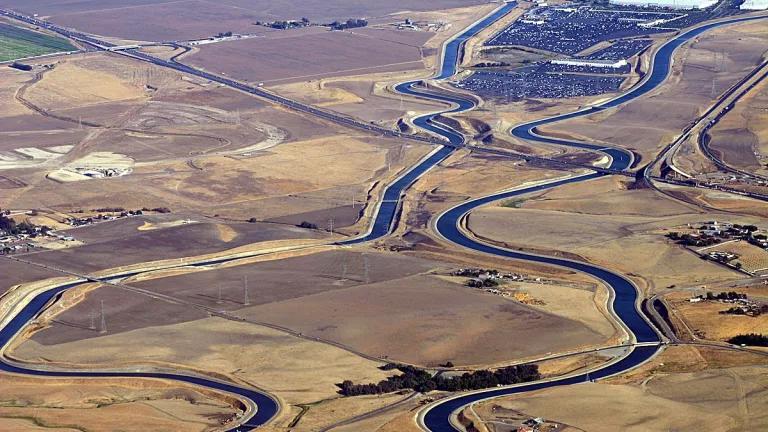CA Prop 4 Includes Historic Investments in Food & Farm Resilience
Proposition 4 can tackle ag supply chain emissions with funds for sustainable farming, farmworker wellbeing, healthy food access, and local food infrastructure.

Acting Governor Mike McGuire signs SB 867
Assemblymember Lori Wilson's Instagram
Last month, the California Legislature and Acting Governor Mike McGuire passed and approved SB 867, the Safe Drinking Water, Wildfire Prevention, Drought Preparedness, and Clean Air Bond Act of 2024. The bond measure will show up as Proposition 4 on voters’ ballots this November, and if passed, will invest $10 billion in various climate change, drought, flood, and wildfire mitigation efforts. NRDC Action Fund fully supports and endorses Proposition 4.
The sustainable agriculture chapter (Chapter 7) is particularly noteworthy because it makes historic investments in food and farm resilience, and would not have been possible without the successful multi-year campaign organized by the Food and Farm Resilience Coalition (FFRC)—a group of 17 environmental, agricultural, farmworker, public health, and food security organizations. Agriculture emits about 8% of the state’s greenhouse gasses, and if emissions across the supply chain were accounted for, that percentage would be greater. SB 867 tackles these supply chain emissions by funding sustainable farming practices, farmworker health and well-being, healthy food access, and local food infrastructure. Specifically, the climate bond includes:
$385 million for climate resilient, sustainable agriculture, including:
- $65 million for the Healthy Soils Program
- $40 million for the State Water Efficiency & Enhancement Program
- $200 million for the Multi-benefit Land Repurposing Program
- $30 million for a new program to protect farmland and improve land access and tenure for beginning and historically underserved farmers
- $15 million for the California Farmland Conservancy Program
- $20 million for invasive species management
- $15 million for research farms at Agricultural Experiment Stations
$90 million for local food system infrastructure and healthy food access, including:
- $20 million for year-round farmers market infrastructure
- $15 million for Tribes to grow, produce, procure, and distribute foods that reflect Indigenous culture and traditions
- $20 million for urban agriculture
- $20 million for mobile markets
- $15 million for farmer equipment-sharing programs and cooperatives
$635 million for farmworker health and well-being, including:
- $610 million for infrastructure to improve water quality or provide clean, safe, and reliable drinking water
- $10 million for the Low-Income Weatherization Program, which funds energy efficiency retrogrades and heating and cooling system installation in farmworker housing
.JPEG.jpg?h=71976bb4&itok=qoL9FmQ1)
The Food and Farm Resilience Coalition in front of the Capitol Building for 2024 Lobby Day
California Climate & Agriculture Network
The Food and Farm Resilience Coalition, co-led by NRDC, launched in 2020 when the COVID-19 pandemic converged with multiple climate disasters to reveal the fragilities of our food and farming systems. Supply chains broke down, grocery store shelves remained sparse, and farmers threw food away due to infrastructure constraints. Wildfires ravaged California communities—including farming communities. Farmworkers continued working in fields despite the dangerous air quality. The picture was grim. In response, the FFRC sponsored AB 125 and, most recently, AB 408. These bills offered visions of rebuilding agriculture by centering health, equity, and climate resilience.
The coalition hosted multiple listening sessions and garnered support from more than 150 groups over the 3.5 years of the campaign. Food service entities, medical health professionals, farmers and ranchers, market organizers, Tribes, advocacy groups, community organizers, and many others told FFRC what they needed to respond to the multiple crises and better serve their communities. The FFRC’s climate bond campaign reflects what the coalition learned from those listening sessions.

The Food & Farm Resilience Coalition with Assemblymember Lori Wilson
California Climate & Agriculture Network
While Prop. 4 does not include the scale of funding needed to fully mitigate agriculture’s climate emissions, the food and farm resilience investments are an important step. These funds will curb emissions across the supply chain, support biodiversity, protect communities, and improve public health. The measure captures years of education and advocacy in Sacramento, and the FFRC is immensely grateful for legislative champions Speaker Robert Rivas and Assemblymember Lori Wilson for their leadership and partnership.
If passed with a simple majority in November, we can help build more climate resilient, healthy, and equitable food and farming systems in California. As Brian Shobe, Policy Director at the California Climate and Agriculture Network (CalCAN) elegantly says,
“California’s family farmers, farmworkers, and communities are worth the investment.”



